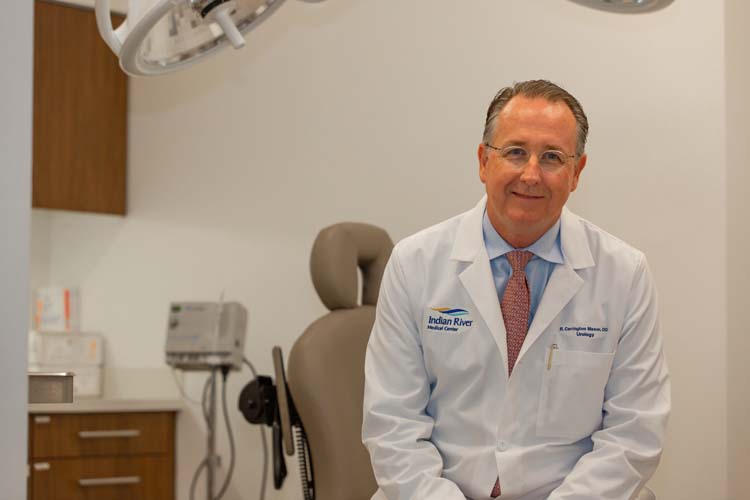
Despite a TV advertising binge that started around 2004 and still continues today for prescription pharmaceuticals such as Viagra, Levitra and Cialis, most men in this country still don’t like talking about erectile dysfunction – even to their doctors.
That’s a bit of problem, since more than half of them suffer from it.
As the Huffington Post reports, “according to the Cleveland Clinic, as many as 52 percent of men experience erectile dysfunction, with it affecting 40 percent of men age 40 and 70 percent of men age 70.”
Newly-arrived Indian River Medical Center urologist Dr. Carrington Mason sheds some interesting light on this male reluctance and how it is overcome.
“The majority of times that a man comes to see a physician about men’s health,” Mason say, “it’s because there’s a woman encouraging him to do it.”
In a more serious tone he adds, “If you’re experiencing erectile dysfunction, speak to your healthcare provider about it. Because the doctor can’t fix what they don’t know about and they probably need to also ask a few other questions to make sure that it’s just erectile dysfunction that is really the issue.”
That, according to Medical News Today, is good advice. The publication points out that “it is always worth consulting a physician about persistent erection problems as they could be caused by a serious medical condition,” such as heart disease, narrowing of blood vessels, high blood pressure, high cholesterol, metabolic syndrome, Parkinson’s disease, or hormonal and thyroid disorders.
Again, the plain-speaking Mason puts that into even simpler terms. “Certainly, in an area like Vero Beach, you’re going to have, just by virtue of age, a higher instance of erectile dysfunction – [but] you’re also going to have comorbidities that go on,” and need to be diagnosed.
“If you’re taking nitroglycerin tablets or something like that, certainly you don’t want to take … [Viagra or similar medications] because the hypotensive effect can certainly be troublesome.”
And, he says, don’t waste your time looking for so-called “herbal” alternatives. “There is nothing that I have found herbally that will consistently give you an erectile response. There are some things that can cause some sort of agitation of the nervous system that is rumored to, but there’s no proven herbal material that will treat erectile dysfunction.”
Getting back to science, the actual mechanics of an erection are relatively simple.
The Urology Care Foundation describes the process this way: “When you are not sexually aroused, your penis is soft and limp. During sexual arousal, nerve messages release chemicals that increase blood flow into the penis. The blood flows into two erection chambers made of spongy tissue (the corpus cavernosum) in the penis. The ‘smooth muscle’ in the erection chambers relaxes, which lets blood enter and stay in the chambers. The pressure of the blood in the chambers makes the penis firm, giving you an erection. After you have an orgasm, the blood flows out of the chambers and the erection goes away.”
But what if – for whatever reason – the pills don’t work?
“The main message I usually try to deliver when I talk about erectile dysfunction is to let people know there’s more to treatment than just the pills,” Mason says. “And when the pills don’t work, there are other things that do work – and something works for everybody. There is a solution, as long as people want to see the solution. We can get this taken care of.”
Like, for instance, by employing penile implants.
As the Mayo Clinic reports, “today’s implants are devices [surgically] placed inside the penis to allow men with erectile dysfunction to get an erection. Penile implants are typically recommended after other treatments for ED fail. The two main types of penile implants, semirigid and inflatable, work differently and each has various pros and cons.”
Mason says today’s improved implant procedures “take 35 to 40 minutes to do, whereas it used to take about an hour-and-half to two hours to do.
“It’s all done as an outpatient. You go home and you’re operational within three to six weeks. It used to be that it was much more long and drawn out, with a hospitalization, but it’s just not that way anymore.
So there are options and there are solutions. All a man really needs to do is get the courage to find a doctor like Mason and have that frank discussion – even if his wife has to drive him to the office.
Dr. Carrington Mason is with the Indian River Medical Center. His office is at 3450 11th Court, Suite 303. The phone number is 772-794-9771.



